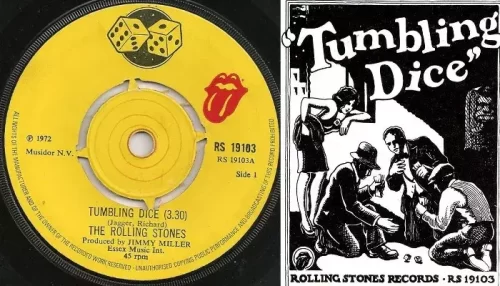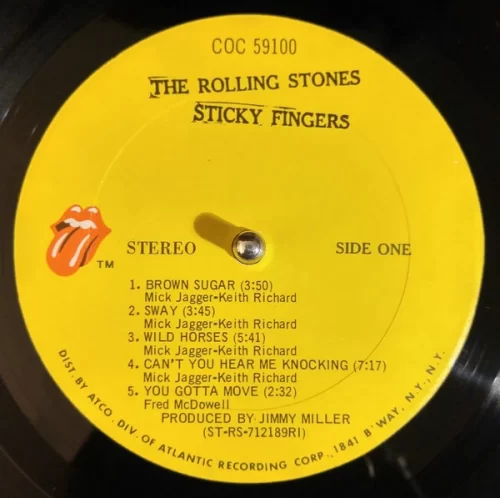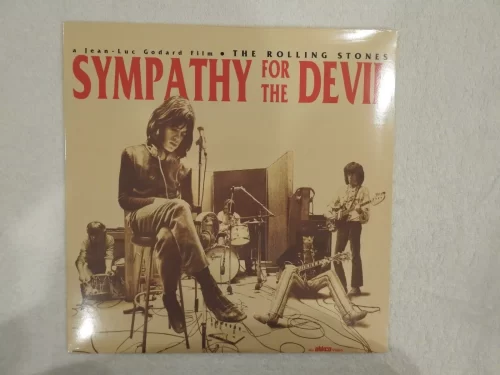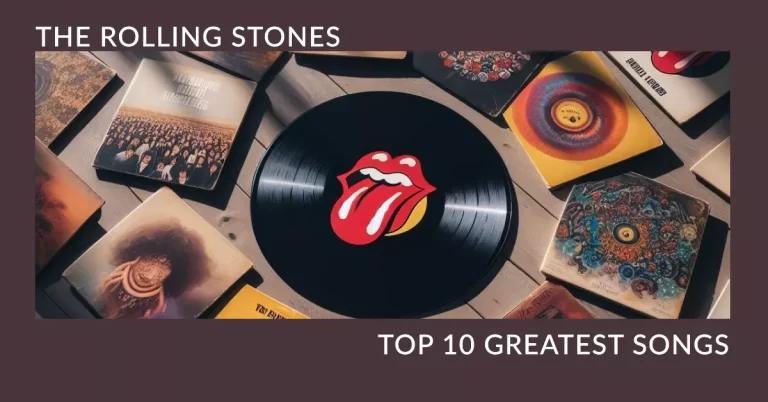No products in the cart.
The Rolling Stones
Top 10 Best Rolling Stones Songs
Let’s go back to the 1960s when the British music invasion began its journey across the Atlantic to significantly impact the American music scene. Leading this wave were The Beatles, whose resounding success in the U.S. catalyzed the explosion of numerous other British artists.
The Rolling Stones – though they never surpassed The Beatles at the peak of their fame – were, for the general public and rock fans in particular, considered more “rock and roll”, more rebellious. The Rolling Stones were a group of punk kids, sneaking out of their homes at midnight to gather with like-minded friends, smoking and drinking into the night. Unlike the Fab Four, the Rolling Stones’ members knew how to navigate internal conflicts to keep making music until now.
With such a vast musical career spanning many years, listing only the top 10 Rolling Stones songs is challenging, but, like a classic track from the band, it builds to a righteous conclusion.
10. Angie (1973)

A classic Rolling Stones song from the often criticized Goats Head Soup. While primarily penned by Keith, Mick’s delivery makes it sound as if he owns the song. Is he still lamenting his split from Marianne Faithfull, or is it about another lost love (considering he was two years into his marriage with Bianca at the time)? The song follows a typical ballad structure, but it stands out with unique elements, especially the haunting background vocal track.
For four decades, enthusiasts have attempted to ascertain if Angie is dedicated to a specific woman. Some speculate it’s Angela Bowie, others suggest Angie Dickinson or Keith’s daughter Angela. In his memoir, Life, Keith clarified: “It was not about any particular person. It was a name like, ‘Ohhh, Diana.’ I didn’t know Angela was going to be called Angela when I wrote Angie“.
9. Tumbling Dice (1972)

Even though Exile on Main St. is now considered one of the Rolling Stones’ most renowned albums, it doesn’t feature a substantial number of chart-topping hits. The fifth track on Exile on Main St. cools things down following Rocks Off and allows the band to settle into an inebriated groove that persists throughout the entire LP. Clydie King, Venetta Fields, and Sherile Matthews add a special touch; while the Stones could infuse a honky-tonk feel occasionally, this track essentially sets the tone for the entire album. Grab a drink, relax, and enjoy four sides of blues-infused rock with a boozy vibe.
8. You Can’t Always Get What You Want (1968)

The Rolling Stones concluded Let It Bleed with a wonderfully extravagant track that, fifteen years later, became the anthem for Baby Boomers settling, albeit with an annoying use in The Big Chill. The London Bach Choir brings the grandiosity, and unlike Phil Spector’s symphonic work on The Beatles’ Let It Be, the Stones actively sought this embellishment. Jagger openly acknowledged his inspiration, pointing to the end of Hey Jude (which was not a Spector production) as the catalyst for this track. What sets it apart is its initial grand scale, followed by a descent to acoustic guitar and French horn (thanks to Al Kooper!), before building back up. It’s a brilliantly crafted composition, yet another Stones track that tends to be taken for granted.
7. Can’t You Hear Me Knocking (1971)

Sticky Fingers marked a pivotal moment for the Rolling Stones, being their first album following Brian Jones’ departure and the debut full-length record with Mick Taylor as his replacement. It promptly dispelled any concerns about the band’s ability to thrive without its founding member. Despite being filled with hits, the seven-minute masterpiece Can’t You Hear Me Knocking is sometimes overlooked, but it has grown into a significant fan favorite over the years.
Regarding the iconic opening riff, Keith Richards mentioned that, like much of his inspiration, it just “came out flying”, “I just found the tuning and the riff and started to swing it, and Charlie picked up on it just like that, and we’re thinking, hey, this is some groove”. The song’s middle section introduces congas by Rocky Dijon and additional percussion by Jimmy Miller, but the real power comes from Billy Preston on the organ and Bobby Keys tearing it up on the saxophone. It’s an exceptional track that truly packs a punch.
6. Jumpin’ Jack Flash (1968)

While it narrowly missed topping the Billboard Hot 100 upon its initial release, if you ask someone randomly to name a Rolling Stones song other than Satisfaction, chances are they’ll mention Jumpin’ Jack Flash. Surprisingly, it’s an older addition to their discography than many realize; the band recorded it in 1968 as a return to their rock roots in response to fan dissatisfaction with the 1967 LP, Their Satanic Majesties Request.
The “Jack” in the song is Keith’s former gardener, Jack Dyer. One night, Jagger crashed at Keith’s place, and the sound of Dyer walking in his rubber boots woke Mick up. Inquiring about the noise, Mick was told by Keith, “Oh, that’s Jack. That’s Jumping Jack”. From this small incident, they collaborated to create one of their most significant hits.
In many respects, the track marked the beginning of a new era for the band. A lackluster follow-up to Their Satanic Majesties Request could have potentially led to a decline, but they rebounded in a way that exceeded almost everyone’s expectations.
5. Wild Horses (1971)

During a break from their 1969 U.S. tour, the Rolling Stones made a secretive visit to Muscle Shoals Sound Studio in Alabama, lacking the necessary recording permit for the U.S. at that time. In just three days, they recorded Brown Sugar, You Gotta Move, and Wild Horses. Legal issues with their former manager, Allen Klein, forced them to hold back the latter song for almost two years.
Despite reaching Number 28 on the Billboard Hot 100, Wild Horses has remained a staple on classic rock radio. It’s one of those Rolling Stones songs where the question arises if the incredibly talented artist they collaborated with at the time deserves a songwriting credit. Even though Gram Parsons didn’t contribute to the studio recording, his influence is palpable. Jagger’s lyrics, featuring lines like Childhood living/Is easy to do/The things you wanted/I bought them for you, stand out as some of his best, balancing sentimentality without veering into full-on McCartney-esque sentiment.
Reflecting on the song, Jagger remarked in 1995, “It’s an example of a pop song taking this cliché ‘wild horses’, which is awful, really, but making it work without sounding like a cliché when you’re doing it.”
4. (I Can’t Get No) Satisfaction (1965)

According to Rolling Stone, this is the second greatest rock song of all time (coming after Bob Dylan’s Like a Rolling Stone, which some find overly precious). It exudes the lusty, rebellious essence of rock and roll.
The tale of (I Can’t Get No) Satisfaction has been recounted so often, that it’s become a well-worn story, but it remains compelling. In a brief version: The Rolling Stones were staying at a hotel in Clearwater, Florida, in May 1965. Keith Richards, before turning in for the night, played around with his tape recorder and ended up with a rough sketch of the song, accompanied by hours of snoring during his sleep.
The title likely drew inspiration from Chuck Berry’s 1955 song 30 Days, which includes the line “I can’t get no satisfaction from the judge”. Just days later, the Stones recorded the song at RCA Studios in Hollywood, and it hit the shelves by early June. This track became their first Number One hit, propelling them to an entirely new echelon of fame and success. In many respects, it stands as the most pivotal song in their career.
3. Paint It, Black (1966)

By 1966, the Rolling Stones were prolific songwriters. In the case of Paint It, Black, the band decided to experiment by incorporating a sitar, a move that some critics viewed as them imitating the Beatles. Despite this, the somber track became their third Number One hit in America. Its unexpected success led the group to include it in the American release of Aftermath. Bill Wyman has persistently claimed substantial involvement in writing the song, although it is officially credited to Jagger/Richards.
In later years, the rest of the group began to acknowledge his contribution. This timeless classic lives up to its dark and despondent title. The lyrics depict a funeral procession for someone close to Jagger (“I see a line of cars and they’re all painted black/With flowers and my love, both never to come back”), yet there seems to be no specific real-life inspiration for the song, which is remarkable considering its direct and emotionally powerful expression of grief. Brian Jones’s sitar opening is as iconic as anything George Harrison accomplished with the instrument.
2. Sympathy for the Devil (1968)

The ultimate opening track on side one. While the title stirred accusations of Satanism, and Jagger’s portrayal as Mephistopheles fueled these interpretations, it’s essentially mischievous. It’s not an overly profound song, nor is it intended to be. Jagger’s message is that humanity has consistently carried out the devil’s bidding throughout history, and, well, look at the state of things in 2023. The song has lost its ability to shock over time, but envision putting on Beggars Banquet in 1968, hearing this a month after Nixon’s presidential election. This track had a transformative impact on lives.
1. Gimme Shelter (1968)

The opening track from Let It Bleed, Gimme Shelter, never saw a single release. However, its frequent inclusion in soundtracks and extensive radio play over the decades has elevated it to one of Rolling Stones’ most recognizable songs. Jagger himself characterizes the track as an “end-of-the-world song”, and its apocalyptic undertones are unmistakable.
The standout element of the song is likely backing vocalist Merry Clayton, who passionately belts out “Rape, murder/ It’s just a shot away” repeatedly. Martin Scorsese holds such admiration for the song that he featured it in three of his films: Goodfellas, Casino, and The Departed. Perhaps realizing its prevalence in Scorsese’s works, the Stones chose not to perform it at the Beacon Theater concerts documented in the movie Shine a Light.
We have some very interesting Rolling Stones T-shirts for you. If you love the music of the Stones, why not take some time to browse through our collection of shirts? Who knows, you might find some favorites to express your musical personality.

























